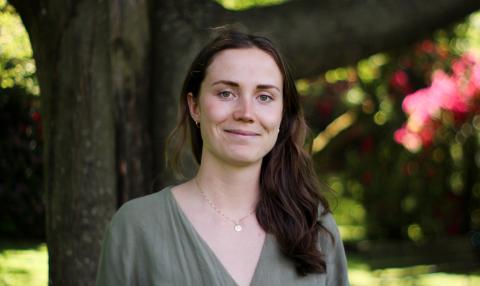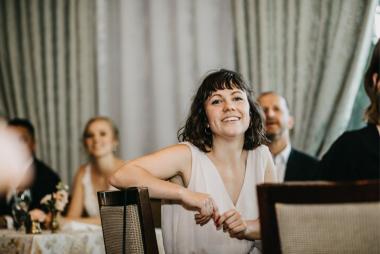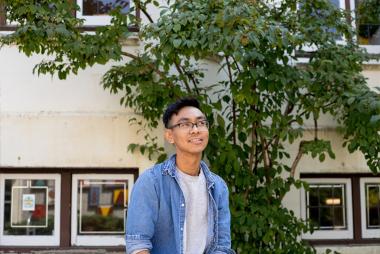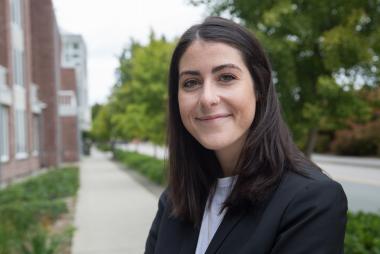"I hope to contribute to building engaged, resilient communities, where folks feel heard and connected to each other."

Jean Roe
- Degree: Master of Community and Regional Planning
- Grad year: 2020
- Program:
- Campus: Vancouver
Jean is pursuing a Master in Community and Regional Planning at the University of British Columbia. Her interests include design, social innovation and community engagement. Over the years, she’s had the opportunity to work with a variety of folks, including urban farmers in New Orleans, cycling activists in Amsterdam, housing advocates in Vancouver, public space professionals in Barcelona and social entrepreneurs in Calgary. These people continue to inspire Jean to dedicate her career towards building engaged, resilient and healthy communities. She has learned that all elements of city building — from food security and urban design to transportation planning and housing affordability — tie into community.
Before starting her master’s in planning, Jean worked at Intelligent Futures, a small but mighty award-winning firm that works at the intersection of community engagement, urbanism, design and sustainability. Alongside the Intelligent Futures team, Jean produces a podcast called 360 Degree City, which covers a wide range of topics and explores cities from every angle. Jean has a Bachelor of Arts in Urban Studies (with a minor in business) from the University of Calgary.
Why did you choose to go into your field of study at UBC?
To be honest, it was very challenging for me to decide where to study for my graduate degree.
I knew I wanted to study planning, but I wasn’t sure where. UBC’s planning program (SCARP) was appealing for a number of reasons, including its focus on the community scale, its dedication towards Indigenous planning and the program’s emphasis on urban design.
I also thought that Vancouver would be a compelling place to study the complex nature of urban planning — it is coined one of the world’s greenest and most livable cities while struggling with an affordability crisis. It’s a fascinating living laboratory.
What has made your time at UBC memorable?
The highlight of my UBC experience has been the people I've met in my program. I’ll always be grateful for having the opportunity to get to know such a wonderfully eclectic group of driven, thoughtful, caring (and fun!) individuals.
What has been your most valuable non-academic experience studying at UBC?
I didn’t spend much time on campus when I wasn’t in class, but my three favourite non-academic aspects of UBC are:
- The Aquatic Centre. Oh what a beautiful place to swim in the mornings, or to de-stress in the hot tub after class.
- The bike ride to UBC. It’s a long ride (with a steep hill) but the route sure wakes you up for morning class (and has beautiful views)!
- Wreck Beach. What a pleasure it is to take a break from schoolwork by walking down to the beach to watch the sunset (and a luxury I was not afforded when living in the prairies!).
Tell us about your experience in your program. What have you learned that is most valuable?
I have learned so much throughout this degree.
I'm very appreciative to have learned about all sorts of design across all sorts of scales, from the design of a neighbourhood or street down to the design of a report or graphic. Also, I am so grateful to have been exposed to the amazing hard work happening in Indigenous community planning. Overall, this degree has equipped me with the confidence and know-how to approach complex problems within interdisciplinary teams.
How are you applying the skills you learned through your studies at UBC?
Right now, I'm applying the research skills I've developed in the last two years to complete my capstone project for this degree. In the past two years, I've had the opportunity to interview dozens of professionals for various research projects — projects about inclusive housing policy, building community in multi-family housing and retail redevelopment. For my capstone, I'm interviewing planners about how the planning process may be accelerated and made nimbler and more adaptive by applying a design thinking mindset.
What advice would you give a student entering your degree program?
If you are considering studying planning but feel intimidated that you don't have a background in the field, do not fear! The beauty of planning school is that it brings together a wide array of students with a variety of backgrounds and career interests.
If you are considering SCARP, I'd suggest connecting with past and current students to understand people's perspectives on the program.
How do you feel your degree has benefitted you compared to a different field of study?
I think SCARP does a great job at encouraging students to reflect on, and develop, their values. And I think it's really important as professionals to understand and articulate one's own core values, so as to not get swept away in the politics, technicalities or practicalities of the working world. As far as I understand, this focus on values is fairly unique to planning, and something I appreciate greatly!
Where do you find your inspiration?
I find inspiration from folks around the world. I've had the privilege of working with cycling activists in Amsterdam, urban farmers in New Orleans, public space planners in Barcelona, housing advocates here in Vancouver and social entrepreneurs in Calgary. All these people, who are working so hard to bring positive change to their communities, inspire me every day.
What are your immediate and/or long-term plans for the future?
I hope to dedicate my career towards bringing people together to collectively approach complex problems (climate change, affordable housing, food insecurity, equitable public spaces, and etc.) through empathy, commitment and creativity. This could unfold in many ways, from working for a social-minded developer to creating long-range plans with a municipality, or working as a consultant. I look forward to the future!
What are your future plans to make a difference in our world?
I hope to contribute to building engaged, resilient communities, where folks feel heard and connected to each other, where our natural systems are respected and flourishing, and where we approach complex problems with empathy, commitment and creativity.


